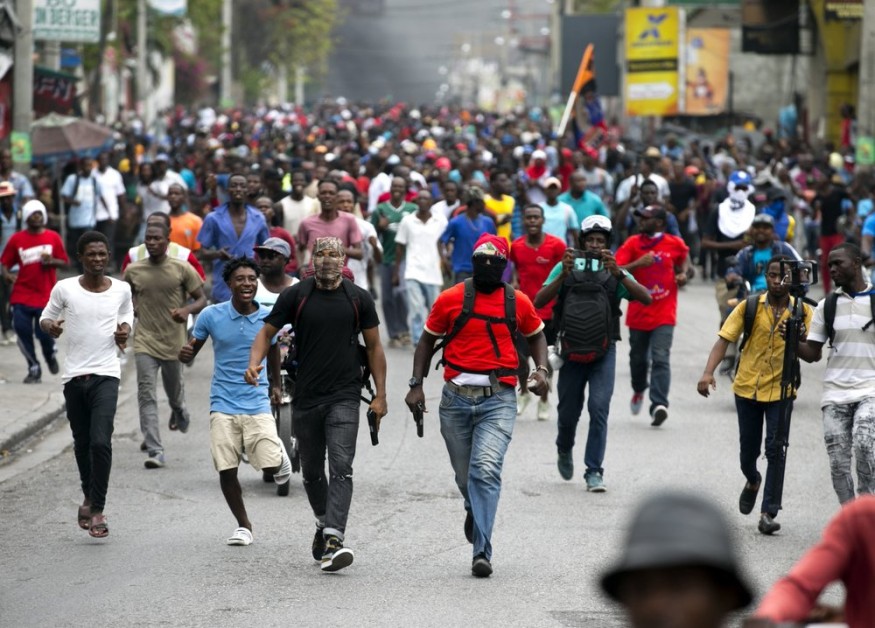Two Dead After Haiti Police Exchange Fire with Troops

Two servicemen were killed after protesting police officers exchanged gunfire with soldiers outside the national palace in Haiti on Sunday.
A protest over pay turned bloody as off-duty Haitian police officers opened fire with soldiers of the newly reconstituted army during a nearly two-hour running gun battle in Port-Au-Prince Sunday.
More than a dozen were wounded and two were confirmed to be killed during the dangerous escalation of protests over police pay and working conditions. A soldier was also confirmed to have been wounded by a bullet in the back.
The violence prompted the government to cancel Haiti's three-day Carnival celebration, which was supposed to have started Sunday afternoon, in order to "avoid a bloodbath."
The off-duty Haitian cops had also set fire to dozens of Carnival floats and stands during recent protests.
Journalists from the Associated Press said they saw dozens of men marching toward the palace to demand better pay for Haitian law-enforcement officers. They also saw the soldiers at the army headquarters building fire into the air. Afterward, an exchange of fire erupted between both parties.
It was not clear which side began firing at the other first.
The clash on Sunday was the most violent since the Haitian police officers started protesting late last year.
More officers in cream and blue police uniforms joined their colleagues outside the palace as the Sunday afternoon wore on. The masked men also opened fire at the military base with semi-automatic pistols and rifles.
Men who spotted a drone taking images of the violence was also tailed back to the offices of Radio Caraibes. The men who followed it also shot at the broadcaster's building. There were no reports of casualties in the attack.
The Haitian cops' protests this month began after over a half-dozen officers were fired over their attempt to unionize. The demonstrations also draw on the widespread dissatisfaction with Haiti's prolonged political and economic crisis, as well as President Jovenel Moise's inability to improve the quality of life.
The government issued a statement on Sunday evening saying it had observed 'with concern and dismay that terror has reigned in certain arteries of the Port-au-Prince metropolitan area'.
Moise, the president, said he recognized the legitimacy of the complaints and would increase collateral benefits for officers during a news conference Saturday. He also announced measures designed to ease the crisis, including a fund to provide officers with insurance.
The protesters, however, said the concessions were not enough.
General Jodel Lessage said soldiers returned fire. He refused to give an injury toll, nor how many people were at the headquarters during the attack.
A uniformed Haitian police officer said they were also demanding the reinstatement of their fired colleagues as well as a pay raise for all officers.
The Haitian cops have been demanding better working conditions for months. They have also been demanding the right to form a union to ensure transparency in talking with the police hierarchy.
Kidnapping for ransom in Haiti has witnessed a spike since the beginning of the year. Fights between rival crime gangs, which regularly set up roadblocks on Haitian highways, have also been a regular occurrence.
The Haitian people have been demanding the resignation of Moise, causing a political crisis that has gripped the Caribbean country for more than a year.
Since coming to power in February 2017, President Jovenel Moise has faced accusations of corruption and opposition against his victory during the elections.
Moise reformed the army in 2017 after it had been disbanded in 1995. He said the military would patrol borders, assist in natural disasters, and avoid domestic affairs.
He has been ruling by decree since January after the country failed to hold elections and the mandates of deputies and senators expired in October.
The political situation has cut Haiti off from some international funding, despite it being the poorest country in the Americas.
Haiti ranks 111 out of 117 countries on the Global Hunger Index.
Subscribe to Latin Post!
Sign up for our free newsletter for the Latest coverage!
© 2026 Latin Post. All rights reserved. Do not reproduce without permission.











